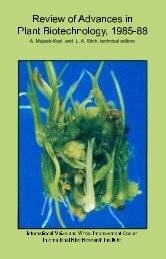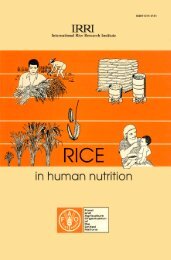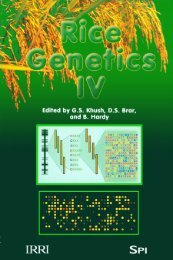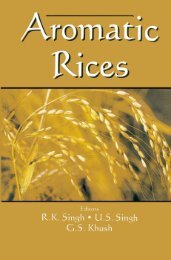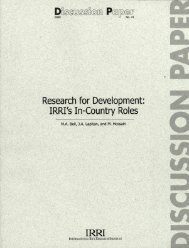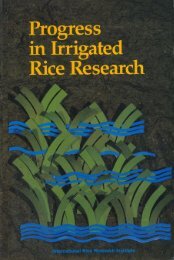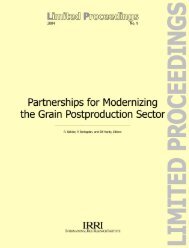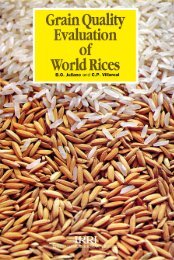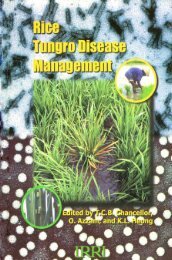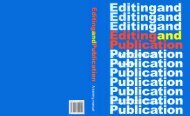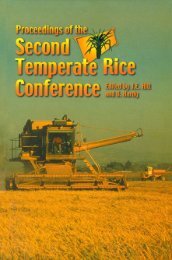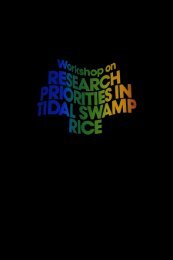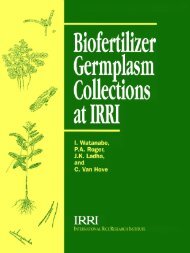An adventure in applied science - IRRI books - International Rice ...
An adventure in applied science - IRRI books - International Rice ...
An adventure in applied science - IRRI books - International Rice ...
- No tags were found...
You also want an ePaper? Increase the reach of your titles
YUMPU automatically turns print PDFs into web optimized ePapers that Google loves.
62 History of the <strong>International</strong> <strong>Rice</strong> Research InstituteThe first physiologist to be <strong>in</strong>terviewed was Terrence Senewiratne, of SriLanka, whom Wortman and I had met at the University of Sri Lanka <strong>in</strong>Peradeniya where he was a member of the faculty. Senewiratne was <strong>in</strong>vited tovisit the Philipp<strong>in</strong>es <strong>in</strong> May 1961 and was offered the position of head of theDepartment of Plant Physiology. Like Ponnamperuma, he had to work for thegovernment for as many years as he had been absent gett<strong>in</strong>g his Ph D <strong>in</strong> theU.S., and he still had 2 years to go before his debt would be paid off. However,he agreed to approach his government to see whether it would waive therequirement and let him jo<strong>in</strong> an <strong>in</strong>ternational center that would have an impacton Sri Lanka’s rice production. Several weeks later, we received a letter fromSenewiratne stat<strong>in</strong>g that he would be unable to jo<strong>in</strong> <strong>IRRI</strong>’s staff.Some years afterward, when Senewiratne was an officer of the AsianDevelopment Bank <strong>in</strong> Manila, he told me that the real reason he had to turndown <strong>IRRI</strong>’s offer was that because he was an only son, his father had ruledthat he must rema<strong>in</strong> <strong>in</strong> Sri Lanka for as long as the parent lived. Thus did Asianfilial ties <strong>in</strong>fluence the composition of <strong>IRRI</strong>’s staff.<strong>IRRI</strong> adm<strong>in</strong>istrators had become well acqua<strong>in</strong>ted with Yoshiaki Ishizuka, aprom<strong>in</strong>ent professor of soil <strong>science</strong> at the University of Hokkaido <strong>in</strong> Sapporo,Japan. He recommended that <strong>IRRI</strong> consider (for the post of plant physiologist)a faculty colleague who had been one of his graduate students, Akira Tanaka.On further <strong>in</strong>quiry, Tanaka was strongly recommended also by Kihara of the<strong>IRRI</strong> Board of Trustees and by Bradfield, then still at Cornell.Tanaka was <strong>in</strong>vited to the Philipp<strong>in</strong>es <strong>in</strong> December 1961 and made a mostpositive impression on the staff. Offered the post of head<strong>in</strong>g the physiologyprogram, he accepted, arrang<strong>in</strong>g to arrive with his family by April 1962.Tanaka developed a first-class physiology program and brought to <strong>IRRI</strong> awealth of Japanese knowledge and expertise, which were great advantages tothe new <strong>in</strong>stitution.Unfortunately, <strong>in</strong> those years, the Japanese Government placed a limitationon the length of time a scientist could stay abroad. Tanaka had to return toJapan <strong>in</strong> 1966 unless he was prepared to sever all connections with official<strong>in</strong>stitutions there. It was a great deal to ask of any Japanese scientist torel<strong>in</strong>quish his hard-won stand<strong>in</strong>g <strong>in</strong> an academic environment like Japan’swhere coveted positions were not readily rel<strong>in</strong>quished to younger aspirantsthrough the retirement of senior <strong>in</strong>cumbents.Tanaka was replaced by Shouichi Yoshida, another former student ofIshizuka’s. In 1965, Yoshida was a scientist at the National Institute of AgriculturalSciences <strong>in</strong> Tokyo where he was work<strong>in</strong>g almost exclusively on silicon <strong>in</strong>rice. I <strong>in</strong>terviewed him <strong>in</strong> Tokyo <strong>in</strong> September 1965 and found that hewelcomed the idea of conduct<strong>in</strong>g research <strong>in</strong> a broader field than was possibleat his post <strong>in</strong> Japan. He was <strong>in</strong>vited to visit <strong>IRRI</strong> <strong>in</strong> January 1966. He was hiredand, with his family, arrived at <strong>IRRI</strong> <strong>in</strong> April 1966 just as Tanaka was about toleave. Not long after Yoshida jo<strong>in</strong>ed <strong>IRRI</strong>, the government of Japan relaxed itsregulation and allowed such scientists to rema<strong>in</strong> abroad <strong>in</strong>def<strong>in</strong>itely withoutpenalty.




